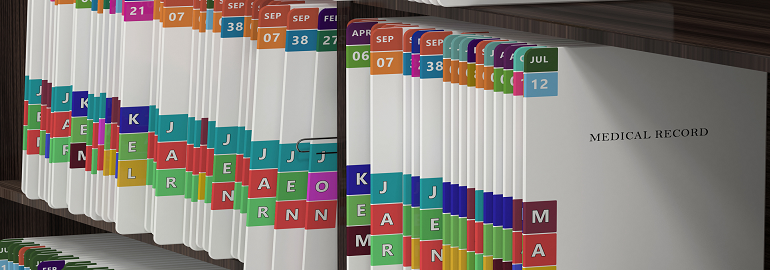
Stock image.
Promoted Content: From time to time, CVN will highlight partner-provided services that we believe are of interest to our readers.
A recent federal court decision has set medical records regulations back more than a decade and resurrected document “profit centers” that have upended how lawyers receive critical records, an attorney for the nation’s leading patient-based records service told CVN.
“It takes us back to 2009 [before the HITECH Act], when copy centers were getting rich off of patients just for providing their records,” Melanie Carpenter, Special Counsel for ChartSquad, told CVN. “It’s absolutely predatory.”
The January decision, by the U.S. District Court for the D.C. Circuit in Ciox Health LLC v. Azar, et al., contained two prongs: it removed fee restrictions applied when a patient requests records be sent to a third party such as an attorney, and it lifted previous rules requiring providers send records electronically at the patient’s request even if the record was not stored electronically.
The decision has sent shockwaves through the legal community, as prices for obtaining client medical records soar and additional hurdles slow the progress of cases.
“The Floodgates Are Open” on Medical Record Charges
Carpenter said the root of the problem is that the decision rests on its use of the term “third-party directives,” when concluding that they fall outside HITECH’s $6.50 flat-fee restriction. That term, she said is not defined by HITECH or HIPAA, the two acts that had largely regulated medical records requests for years.
Without a firm definition of “third-party directive,” medical providers, she said, are wildly expanding what the term encompasses. For example, many providers now consider a patient’s request that medical records be sent to them in care of a law firm as a “third-party directive” that falls outside the fee cap.
“Some are even going so far as to say if your email address ends in .gov or .edu it’s a third-party request because the government or educational institution owns that domain,“ Carpenter said. “Nearly every request is turning into a third-party directive.”
Carpenter told CVN that there are rumblings on the state and federal level about changes to close these loopholes. However, no action is imminent. In the meantime, the cap has been blown off of records-request fees. Centers now charge thousands of dollars for records that were, only months before, subject to HITECH’s $6.50 flat fee. “Now the floodgates are open and you’re seeing invoices where they’re charging thousands of dollars per recordset,” Carpenter said, adding providers have tried to mandate patients use their own proprietary portals where they must agree to waive fee restrictions to receive their records. “Every day I see something new that shocks me,” Carpenter said.
The decision’s fallout has left many patients unable to conveniently and affordably order their records, and it has dealt a blow to attorneys by stretching case timelines and drastically increasing costs. “Any attorney knows that you can win a case, settle a case for the most money you can imagine,” Carpenter said, “but if your costs are super-high no one’s happy.”
To solve the problem, attorneys can try to trust their clients to do all the legwork of requesting and retrieving the files themselves. “That’s scary,” Carpenter said, noting clients, who are injured and forced to navigate a labyrinth of request venues often struggle to obtain their records.
The Patient-Centered Application That Solves the Problem
However, Chartsquad solves that problem through a simple-to-use, industry-leading app that allows patients to request their medical records and seamlessly share them with anyone they choose.
“If you know how to write, send, and forward an email, then you can use ChartSquad,” Carpenter said.
Carpenter told CVN that, to her knowledge, ChartSquad is the only patient-based records application that allows patients to share their records with their attorneys. And the system’s flexibility allows the full range of firms, from solo practitioners to the nation’s largest practices, to see its benefits.
Attorneys sign up online for free, refer their clients to ChartSquad through the online portal, and the company does the rest, updating patients and their attorneys as records are delivered. The process for attorneys takes only minutes. And a nationwide study before the Ciox opinion was handed down showed firms using ChartSquad received all of a case’s medical records in an average of just 15 days, compared to more than 4 months without the portal. With ChartSquad, firms spend a fraction of their time on record collection, allowing them to close cases more quickly.
And ChartSquad’s optional, free billing discovery service makes the process even more efficient. With it, experts will review patient treatment records and automatically submit requests for attendant billing. The service eliminates the search for separate anesthesiologist invoices, for example, and attorneys pay only for the additional requests.
Most importantly, because the request comes directly from the patient, HITECH’s flat-rate fees apply, avoiding the uncapped charges other requests can incur in the wake of Ciox.
Carpenter believes HHS should appeal the Ciox decision and hopes future state and federal regulation may temper soaring record-request fees. However, regardless of the outcome on those fronts, she said ChartSquad’s application aims to serve patients and their attorneys.
“We really encourage individuals to take control over their medical records, so that they can be used in their case and for reasons having nothing to do with the case,” Carpenter said. “Our goal is really to help the patient.”
Related Information





